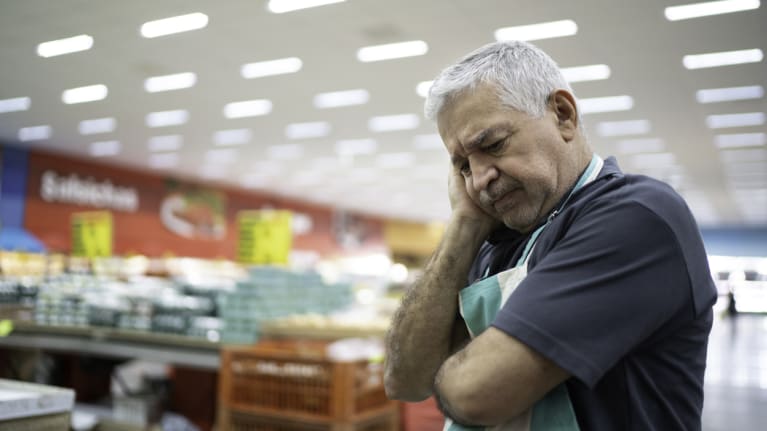
Picture this: You walk into your local Target or CVS to buy toothpaste, only to find the item you want locked behind a loss-prevention case. You wait in line in front of the locked case with other customers, one muttering, “Does anybody even work here?” A few minutes later, an overwhelmed, out-of-breath employee appears with the key and opens the case. You take your “liberated” toothpaste to a self-checkout kiosk, pay and leave.
The last few years have been tough for the retail industry, and in particular, the retail employee experience. “Retailer efforts to reduce theft have put employees in the line of fire of disgruntled customers who are angry about merchandise not being easily accessible on the shelf,” said Steven Rowland, host of The Retail Warzone podcast and a former retail manager. “It’s just one in a long list of situations where low-wage retail employees are set up for abuse from the public.”
More than 30 million people work in the U.S. retail industry, according to the National Retail Federation (NRF), meaning it employs more private-sector workers than any other part of the economy. But a recent U.S. News and World Report ranking of 190 jobs named retail salesperson as the worst job in the entire U.S. economy, mostly due to low wages and limited opportunities for growth.
Making a Hard Job More Difficult
Among the recent factors diminishing the retail employee experience are:
1. Increases in theft and theft-deterrence policies. Retailers experienced a 26 percent increase in organized retail crime in 2021, according to the NRF, and 8 in 10 retailers reported increased violence and aggression associated with such crime. Flash mob robberies in big cities such as Los Angeles, San Francisco and New York have been a highly visible part of the problem.
In response, some retailers have locked up certain products and taken other loss-prevention measures that have made life more difficult for retail employees. For example, increased video surveillance and bag checks have raised employee privacy concerns.
2. Political and cultural clashes in the aisles. At the height of the COVID-19 pandemic, a spate of viral videos appeared in which customers who opposed mask-wearing confronted retail employees about store requirements that customers and workers wear masks. Retail employees often had to serve as front-line enforcers of local public health mandates and store policies on masking, on top of their other in-store duties.
More recently, clashes broke out earlier this year at Target stores between customers and employees over product displays for LGBTQ+ Pride Month in June. Target eventually removed some of the items, but customers who confront retail employees for political and cultural reasons could remain a serious safety concern.
3. Inventory and supply chain problems. Retail stores have encountered unprecedented challenges in keeping certain goods in stock, most (in)famously toilet paper and baby formula, largely due to supply chain disruptions caused by the pandemic. Ongoing supply chain problems have created frustrations for both customers and the front-line employees who have to respond.
4. Reduction in retail profits and impact on staffing. The retail industry had suffered financial losses for years prior to the pandemic, but the loss of foot traffic during the pandemic and the spate of shoplifting have only exacerbated its financial woes. Dick’s Sporting Goods blamed theft as a significant reason for its 23 percent drop in profits in the second quarter of 2023. Target warned in May that it expected to lose half a billion dollars this year because of rising theft.
Such financial losses inevitably impact store staffing. Analysts at UBS project the closure of as many as 50,000 U.S. retail outlets in the next five years, and many retailers have already cut employee staffing and hours.
5. Ongoing tension around unionization. Labor shortages during the pandemic led some retail workers to either quit and find another job, or stay and demand better pay and working conditions. Unionization efforts have spread to retail companies such as Trader Joe’s, REI and Apple. Some of the retailers have subsequently cut pay or closed stores.
Joseph Romsey is a freelance writer in Boston.


